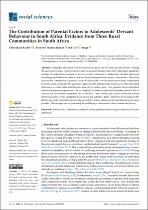| dc.contributor.author | Chinyakata, Rachel | |
| dc.contributor.author | Roman, Nicolette Vanessa | |
| dc.contributor.author | Donga, Gift T. | |
| dc.date.accessioned | 2022-07-07T09:03:19Z | |
| dc.date.available | 2022-07-07T09:03:19Z | |
| dc.date.issued | 2022 | |
| dc.identifier.citation | Chinyakata, R. et al. (2022). The contribution of parental factors to adolescents’ deviant behaviour in South Africa: Evidence from three rural communities in South Africa. Social Sciences, 11(4), 152. https://doi.org/10.3390/socsci11040152 | en_US |
| dc.identifier.issn | 2076-0760 | |
| dc.identifier.uri | https://doi.org/10.3390/socsci11040152 | |
| dc.identifier.uri | http://hdl.handle.net/10566/7560 | |
| dc.description.abstract | Challenges associated with adolescents are prevalent in South African societies. During
the adolescence stage, children may become involved in deviant behaviour. Although a significant
number of studies have focused on the factors that contribute to adolescents’ deviant behaviour,
including parental factors, there is paucity of research specifically in rural communities. This study
explores the contribution of parental factors to adolescents’ deviant behaviour in rural communities
in South Africa. Guided by the qualitative approach, the present study makes use of semi-structured
interviews to collect data and thematic analysis to analyse data. The parental factors identified
include less parental supervision, a lack of support, an absence of parental discipline, parent’s lack of
concern and the inability of parents to be role models. | en_US |
| dc.language.iso | en | en_US |
| dc.publisher | MDPI | en_US |
| dc.subject | Adolescents | en_US |
| dc.subject | Parental monitoring | en_US |
| dc.subject | Parental factors | en_US |
| dc.subject | Parental supervision | en_US |
| dc.subject | Child behaviour | en_US |
| dc.subject | South Africa | en_US |
| dc.title | The contribution of parental factors to adolescents’ deviant behaviour in South Africa: Evidence from three rural communities in South Africa | en_US |
| dc.type | Article | en_US |

